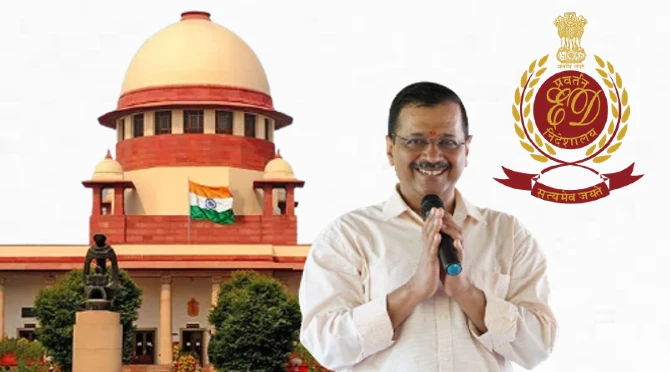
The Supreme Court on Friday granted interim bail to Delhi Chief Minister Arvind Kejriwal in a money laundering case filed by the Enforcement Directorate (ED) related to the alleged excise policy scam. However, the AAP convenor will remain in jail as the Central Bureau of Investigation (CBI) has since arrested him in a related matter.
The top court stated that it is up to Kejriwal to decide whether he should continue as chief minister. “We are conscious of the fact that Arvind Kejriwal is an elected leader,” said a bench of Justices Sanjiv Khanna and Dipankar Datta, while also noting that Kejriwal has been in incarceration for over 90 days.
The Apex Court also referred the questions concerning the legality of Kejriwal’s arrest in the Enforcement Directorate (ED) case to a larger bench. The court stated that, since the matter involves the right to life and the issue of arrest has been referred to a larger bench, Kejriwal should be released on interim bail.
The Supreme Court framed three questions related to the power and necessity of arrest under Section 19 of the Prevention of Money Laundering Act and the ED’s arrest policy. It directed that Kejriwal be released on interim bail according to the conditions set in its May 10 order.
Previous Interim Bail
When releasing the AAP convenor on interim bail on May 10 for electioneering during the recent Lok Sabha elections, the top court had imposed conditions, including that he could not visit his office or the Delhi Secretariat during the bail period. Additionally, Kejriwal was restricted from signing any official files unless absolutely necessary to obtain the Lieutenant Governor’s sanction during the 21-day interim bail period.
On May 17, the Supreme Court had reserved its verdict on Kejriwal’s plea challenging the legality of his arrest by the ED on March 21. The apex court had sought a response from the ED on Kejriwal’s plea challenging his arrest in the money laundering case on April 15.
The AAP leader has challenged in the Supreme Court the April 9 order of the Delhi High Court, which upheld his arrest in the case. The high court had found no illegality in the arrest and noted that the ED had little option after Kejriwal repeatedly skipped summonses and refused to join the investigation.
Bail by Trial Court
On June 20, Kejriwal was granted bail by a trial court on a personal bond of ₹1 lakh. However, the ED challenged this order in the Delhi High Court, claiming the trial court’s bail order was “perverse,” “one-sided,” and “wrong-sided,” and that the findings were based on irrelevant facts.
On June 21, the Delhi high court imposed an interim stay on the trial court’s bail order pending a decision on the ED’s application for interim relief. On June 25, the high court issued a detailed order staying the trial court’s bail order.
The Delhi Chief Minister was arrested by the Central Bureau of Investigation (CBI) on June 26 in connection with a corruption case related to the alleged excise policy scam.
A plea challenging his arrest by the CBI is currently pending before the Delhi High Court.
The case involves alleged corruption and money laundering in the formulation and execution of the Delhi government’s excise policy for 2021-22, which has since been scrapped.




